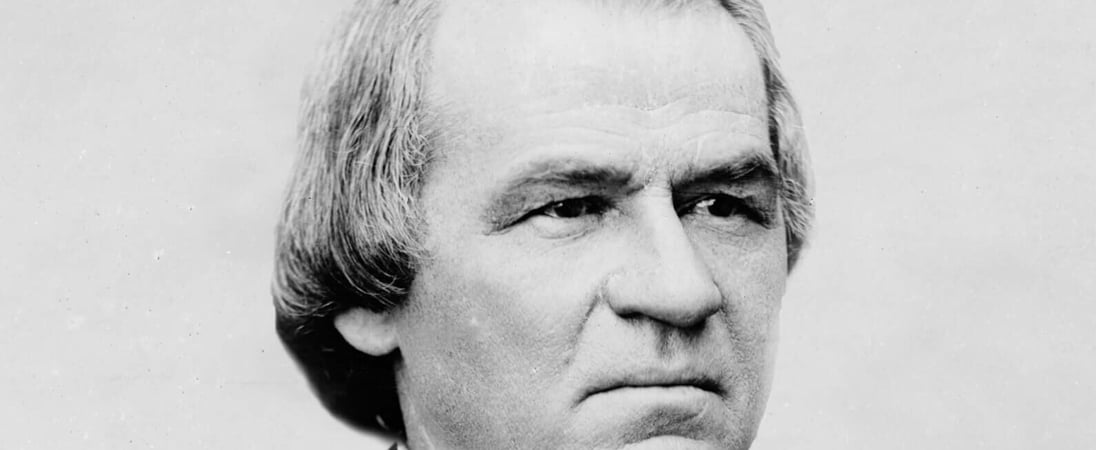
Andrew Johnson's birthday
Andrew Johnson, born on December 29, 1808, had a notable journey in American history. Rising from poverty, he became the 17th President of the United States. Following the Civil War, his presidency was filled with challenges as he worked on rebuilding the nation.
Johnson’s life, marked by political struggles and resilience, ended on July 31, 1875. His story, from a humble start to leading the country, remains a significant part of U.S. history.
Childhood and Early Years
Andrew Johnson’s early life was marked by hardship and limited opportunities as he came from a modest background. Jacob’s father worked as a janitor, and his mother, Mary, was a weaver. Tragically, Andrew lost his father at a young age, which added to the family’s struggles.
Education was not a significant part of Johnson’s childhood. He received very little formal schooling. His education was so limited that he did not learn to read until he was 17 years old. To help support his family, Andrew started working as an apprentice tailor at a young age.
Despite these challenges, Johnson showed a keen interest in learning. He taught himself to read and, later, to write. His self-education played a crucial role in shaping his future. Johnson’s early experiences with poverty and labor shaped his views and character, influencing his political career later in life.
Johnson’s determination to self-education was not just for his benefit. As he grew older, he became a strong advocate for public education. This stemmed from his own experiences of limited schooling. He believed everyone deserved the opportunity to learn, regardless of their social status.
This belief in education as a path to improvement was a key theme throughout his political career. It also shaped his efforts in promoting educational policies during his time in public office. Johnson’s childhood, marked by poverty and self-driven learning, laid the foundation for his future endeavors and perspectives.
Andrew Johnson: A Story of Triumph and Achievement
Andrew Johnson’s journey from tailor to President is a remarkable tale. His career in politics began at a young age. He first served as an alderman in Greeneville, Tennessee. His rise was rapid. By 1829, Johnson had become the town’s mayor. His down-to-earth style and self-taught background resonated with many.
Johnson’s success didn’t stop there. He served in the Tennessee State Legislature and the U.S. House of Representatives. His dedication to the Union during the Civil War was notable. Despite coming from a Southern state, he remained loyal to the Union. This loyalty earned him respect and recognition.
In 1862, President Abraham Lincoln appointed Johnson as the Military Governor of Tennessee. His leadership was crucial in restoring Tennessee to the Union. Johnson’s efforts here were a highlight of his career. They showed his commitment to unity and the nation’s welfare.
The peak of Johnson’s success came in 1865. After Lincoln’s assassination, he became the 17th President of the United States. As President, Johnson worked hard to rebuild the nation after the Civil War. He focused on restoring Southern states to the Union. His presidency was a period of significant change and challenge.
Johnson’s achievements are a testament to his resilience and determination. From a humble tailor to a President, his life story is a powerful example of overcoming odds and achieving greatness.
Some Interesting Facts about Andrew Johnson
Self-Taught Reader: Johnson didn’t learn to read until he was 17. His wife, Eliza McCardle, helped teach him mathematics, writing, and reading.
Loyalty During Civil War: Despite being a Southerner, Johnson remained loyal to the Union during the Civil War, a controversial and admired stance.
Military Governor: Abraham Lincoln appointed him the Military Governor of Tennessee in 1862, where he played a crucial role in re-establishing federal authority.
Accidental Presidency: Johnson became President after Lincoln’s assassination, making him the first vice president to ascend to the presidency due to an assassination.
Impeachment Trial: He was the first U.S. president to be impeached in 1868, though he was acquitted by just one vote in the Senate.
Homestead Act Veto: He vetoed the extension of the Freedmen’s Bureau and the Civil Rights Act of 1866, policies crucial to Reconstruction, although Congress later overrode his vetoes.
Returning to Senate: Johnson achieved another political milestone after his presidency by returning to the Senate in 1875; he was the only former President to do so.
Also on this date...
Tick Tock Day
Work through your to-do list and finish any odd jobs so that you can leave your worries behind, and focus on the future.




